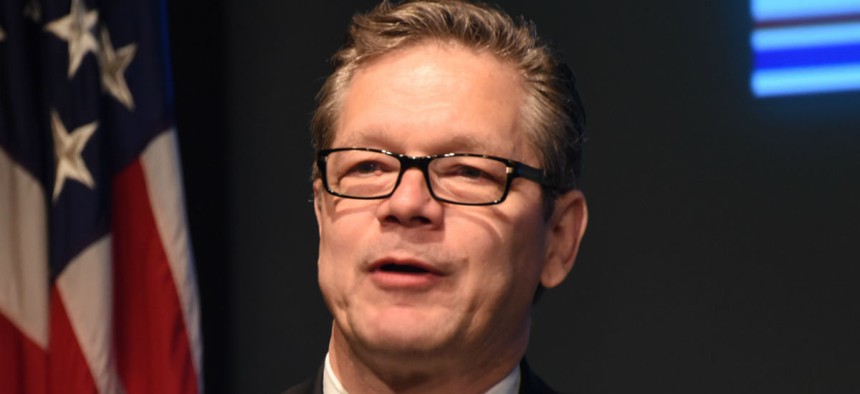Is Customs and Border Protection Foregoing Billions in Fees?
Nonprofit asks DHS watchdog to probe collections on imports.
Customs and Border Protection, which works not only to keep terrorists out of the United States but to fund government by collecting import fees, may be leaving billions of dollars on the table annually.
That’s according to a letter sent Tuesday by the nonprofit Project on Government Oversight to the inspector general of the Homeland Security Department. It warned that because of mismanagement, “CBP has potentially lost billions of dollars due to its unwillingness to collect appropriate duties, penalties and interest from non-compliant importers.”
POGO Executive Director Danielle Bryan, after reviewing past Government Accountability Office reports on CBP’s handling of fees and information from Sen. Chuck Grassley, R-Iowa., wrote that “CBP had not been maintaining its legally required levels of audit staff, [and] previously reported trade enforcement issues continued to present long-term challenges with significant revenue implications for the government.”
She credited the agency with efforts to address misreporting of component costs, but called the resulting changes “unacceptably slow.” POGO said it had uncovered new information—though not as much as it would need for a full understanding—showing that “CBP lost millions of dollars between 2008 and 2013 by failing to correct watch importers’ wrongful allocation of component costs in the calculation of duties.”
In asking Inspector General John Roth to act, she wrote, “It is not only time for a complete audit of CBP’s revenue collection practices, but also for investigations into specific schemes to avoid paying lawful duties and into the creation of systems to prevent duty underpayment.”
CBP is "committed to protecting the American economy to ensure a level playing field for domestic industry, to include enforcing trade laws and ensuring the collection of duties from importers," the agency said in a statement.
As one of the government’s most important revenue collectors, CBP in fiscal 2015 processed more than $2.4 trillion in trade and collected more than $46 billion in revenue, POGO wrote. The resulting duty, tax, and fee revenues (plus fines, penalties and interest paid by import law violators) go to general fund accounts maintained by the Treasury and Agriculture departments as well as the Army Corps of Engineers. Treasury dispenses the money to other agencies according to applicable law and rules, the letter noted.
POGO challenged CBP’s calculation of proper import duties using the example of a wristwatch, though adding that it applies to textiles, apparel, computer parts and jewelry duties. “Importers are supposed to accurately break down the cost of the watch by component (case, band, battery, and movement) for duty calculations,” the letter stated. “Different duty rates apply depending on the type of watch, but generally the duty rate for a watch’s movement is a flat cent ($0.01) value while the duty rates for the other components are percentages of the component’s average cost. Thus, if an importer allocates more of a watch’s cost to the movement than to the other components, duties owed decrease drastically.”
The researchers also said they “learned that importers generally misreport duties owed by presenting false invoices with understated values to CBP while using separate, cost-accurate invoices for their customers, a practice known as ‘double invoicing,’ “ said the letter, based in part on information from a former CBP manager.
“Not collecting the proper duties, interest, and penalties from importers encourages importers to be non-compliant and hurts compliant businesses,” POGO wrote. “Failing to punish non-compliant importers puts American jobs at risk and inhibits compliant businesses’ abilities to compete both nationally and internationally.”
POGO recommended that the IG consider such remedies as standard product valuations, better training, giving employees more authority to challenge the duty assessments, and moving some functions from CBP to Treasury, “where revenue collection is a higher priority.”
The letter was copied to Homeland Security Secretary Jeh Johnson and the major Senate and House committee leaders dealing with Homeland Security and finance.
CBP has been under fire lately since the DHS watchdog reported that it had converted investigative specialists into criminal investigative positions that may not be needed.
Part of its fee-collecting problems may be due to understaffing by import specialists. “Lack of sufficient focus and resources not only costs the U.S. Treasury in terms of customs duties and revenue loss, but also costs American companies in terms of lost business to unlawful imports,” said National Treasury Employees Union National President Tony Reardon in testimony submitted to a Senate Finance Committee hearing Wednesday on implementation of the 2015 Trade Facilitation and Trade Enforcement Act. “Chronic staffing shortages, inequitable compensation and ‘lack of mission focus’ are big reasons why experienced CBP commercial operations professionals are quitting or preparing to leave.”
The DHS IG office did not respond to a request for comment.




